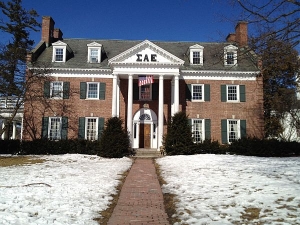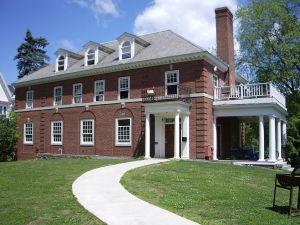Editor’s Note: In light of the overwhelming negative press coverage of the College’s Greek system in local and national publications, The Dartmouth Review seeks to introduce some positivity into the dialogue. In this installment, the second in a series of profiles of individual Greek houses, The Dartmouth Review focuses on the philanthropic and community-building efforts of three Greek houses: Sigma Alpha Epsilon, Kappa Kappa Gamma, and The Tabard. This series is not intended to refute the claims of the Greek system’s detractors. Rather, it seeks to emphasize the positive value that Greek organizations can—and already do—add to the Dartmouth community: value that has been largely ignored in the broader discussion of the Greek system’s future at Dartmouth.
Sigma Alpha Epsilon
Sigma Alpha Epsilon, or “SAE,” is the New Hampshire Alpha Chapter of the national fraternity. With a diverse membership known for its focus on academics and career development, SAE is well represented among a variety of campus organizations. The editor-in-chief of the Dartmouth Undergraduate Journal of Science, the treasurers of both Student Assembly and the Greek Leadership Council, the 2017 Class Council President, and the Director of Dartmouth Model United Nations are some of the campus leaders SAE counts among its membership. The editor-in-chief of the Review, Nick Desatnick ‘15, is also a brother of SAE.
Within the fraternity, academics are a priority. Incentives are provided to encourage brothers to maintain high Grade Point Averages, including grants for the top academic performers in the brotherhood. In addition to these grants, house funds are put aside each term to provide interest-free loans to brothers, which may be used to purchase school supplies and textbooks, pay for music lessons, or subsidize any other academic- or extracurricular-related endeavor. An Academic Chairman is elected each year to coordinate these incentives and generally support any brother in need of academic assistance.
SAE President Daegwon Chae ’15 says diversity is one of the defining characteristics of the fraternity. The brotherhood includes citizens of Spain, Brazil, Haiti, Korea, and Canada—a geographic mix that makes SAE a microcosm of the Dartmouth campus at large. “SAE, and Dartmouth’s Greek system in general, is representative of the best that Dartmouth has to offer: community, diversity, and personal development,” says Chae.
The diversity found in SAE also encompasses the members’ interests. Brothers are heavily involved in entrepreneurial efforts on campus, and work closely with the Dartmouth Entrepreneurial Network, or DEN. One SAE brother planned and executed Startup Weekend this term, which was hosted at DEN and sponsored by Google. Other brothers are running an entrepreneurial “boot camp” series, where managing partners from venture capital firms like NEA, Polaris Partners, and Norwest will interact with students and provide advice on starting businesses. SAE brothers are also working to further the bounds of medicine; some conduct cancer research involving nanoparticle mediated radiation therapy at DHMC, while others are working on analytical techniques to decrease the risk of Sudden Infant Death Syndrome (SIDS).
As is true of most of Dartmouth’s Greek houses, SAE takes pride in its philanthropic efforts and commitment to community service. Membership in the fraternity is contingent on the satisfaction of a mandatory service requirement each term, and the Service Chairman emails the brotherhood at the start of each week with a list of service opportunities. SAE’s have also assumed leadership roles in philanthropic endeavors like the cooking program at the Upper Valley Haven homeless shelter, where many brothers volunteer on a weekly basis.
SAE maintains high standards for the behavior of its members. Brothers are elected to be part of an internal judiciary council, which determines when a breach of the fraternity’s code of conduct has occurred and metes out sanctions on a case-by-case basis. Regular meetings of the brotherhood are also held to discuss how to prevent high-risk behavior. While some may attribute the adoption of this measure to the sensational allegations of hazing leveled against the fraternity by Andrew Lohse in 2012, Chae points out that Lohse’s allegations did not reflect reality, and that the house as a whole realized that the prevention of dangerous behavior would benefit the community at large. As such, SAE officially ended pledge term—in accordance with a new policy instituted by the national fraternity—several months before Dartmouth’s Inter-Fraternity Council voted to do so.
Above all, Chae finds the support network at SAE to be the fraternity’s greatest quality, and an essential part of many brothers’ Dartmouth experience: “As a brotherhood, we depend on each other for everything. Everyone goes through tough times at college; we enjoy supporting each other, and see it as natural. It’s very powerful to have a group of people who will support you through thick and thin—something that is a powerful aspect of Greek houses in general.”
Kappa Kappa Gamma
Kappa Kappa Gamma sorority, commonly known as “Kappa,” is one of several nationally affiliated sororities on Dartmouth’s campus. Although as a national sorority Kappas is unable to host parties like its local counterparts, the sorority has made great strides in opening its house and its sisterhood to the campus community in other ways. According to Kappa President Myrel Iturrey ’15, “Historically, the space has been underutilized; but our executive officers have been trying really hard to open it up to campus since, as a space controlled by women, it can serve a valuable purpose.” Iturrey continued, “The way we’ve responded to President Hanlon’s call to change is primarily to open Kappa’s space to more campus events. Greek houses aren’t just a place for social events, they are also for fostering intellectual and academic development of both members and the larger community.”
To that end, Kappa has opened its house to campus for performances by arts groups and academically focused events. This fall, Kappa hosted the kickoff event for a lecture series on entrepreneurship run by Tuck professor Gregg Fairbrothers. At the event, Sherri Oberg ’82 Tuck ’86, a Kappa alumna, spoke to an audience of faculty and students from across campus about how her Dartmouth experience prepared her to run her company, Edu21C.com. Furthermore, the sorority recently created a new position, the Freshman Outreach Chair, to organize events geared towards freshmen; the sisters of Kappa hope this will help introduce freshmen to Greek life in a setting that doesn’t involve drinking or partying. The creation of this new position is part of a broader effort by the sorority to foster genuine relationships between upperclassmen and freshmen. Within the sisterhood itself, Kappa encourages academic development outside the classroom through events like “Facultea,” held every term, in which sisters invite their professors to enjoy tea and snacks, and converse in a more casual environment. Each year, Kappa elects an Academic Chair to host regular office hours and incentivize high achievement with weekly prizes for sisters who have demonstrated academic excellence.
Within the membership, Kappa has implemented a variety of old and new practices to reduce the high-risk behaviors that President Hanlon and his presidential steering committee have vowed to tackle. One of the sisterhood’s established customs is internal accountability. At Kappa’s social events, including formals and semi-formals, the sisterhood has a “Big-Little” policy. This procedure works within the framework of the sorority’s existing mentorship system, which pairs older sisters with younger members into families of “big sisters” and “little sisters.” These trios of seniors, juniors, and sophomores are responsible for looking out for one another at social events. Whenever a Kappa sister’s health is at risk, her big or little is responsible for ensuring her well-being and accompanying her home safely. This practice provides an additional measure of accountability, as sisters monitor their behavior not only for their own safety, but to prevent ruining the night for their big or little sisters as well. In addition to this customary safeguard, five or six Kappa sisters volunteer as sober monitors at the sorority’s social events to prevent high-risk behavior. According to Iturrey, this practice of monitoring the safety of others extends beyond the Kappa sisterhood: “We try not to just watch out for Kappas; we watch out for the Panhellenic community, and Dartmouth’s female community as a whole. All women are sisters, not just the ones in our house.”
Kappa has supplemented their traditional practices to reduce high-risk behavior with several new ones. Chief among them, the sisterhood’s “Standards Committee” has created the new position of Wellness Chair to address instances of a sister’s engagement in high-risk behaviors, like alcohol or drug abuse. The Wellness Chair, who will be trained as a Drug and Alcohol Peer Advisor (DAPA), will make sure that sisters who are struggling with substance abuse are being monitored consistently and in a non-threatening manner. “It is a shame that national sororities are perceived as being limited in a way that somehow precludes them from participating in the conversation about how to reduce high-risk behaviors,” Iturrey said. “Kappa is creative about using the tools at its disposal to make campus more inclusive, safer, and overall more in line with Dartmouth’s values.”
Kappa is also a standout in its philanthropic efforts. In the first six weeks of the fall term, the Kappa sisterhood collectively logged 503 hours of community service, through events like the Selamta Lead the Way 5K and CHaD Hero. Kappa sisters also participate in smaller weekly service events, like baking for David’s House and cooking dinner at the Upper Valley Haven. Recently, Kappa also co-hosted a snack table with Theta Delta Chi fraternity (TDX) to raise money for Mary Stinson, co-proprietor of the beloved Hanover institution, Stinson’s Village Store, who was diagnosed with cancer this fall.
While Iturrey acknowledges that a case can be made for the leadership skills and values that Greek houses instill in their members, she finds the most important aspect of sorority life to be the community it fosters. “You’d be hard pressed to find another organization that is both entirely composed of females and not isolated by some specific interest,” Iturrey commented. “There are groups for women interested in business, or science, or a capella; but sororities are the only organizations that bring women together purely on the basis of their womanhood. And the willingness of Kappa sisters to go the extra mile for other members of their community builds a great social culture.”
The Tabard
Sigma Epsilon Chi, better known as “The Tabard,” is one of three co-ed Greek organizations on Dartmouth’s campus. Known for their diversity, inclusivity, and the unique position they occupy within the Greek system, the membership of The Tabard provides one of Dartmouth’s alternative social spaces within the existing structure of the Greek system. The Tabard provides a home to 69 active members, including a class of 26 new members this fall. Several nights a week, The Tabard opens its doors to all of campus and contributes a social environment that is both very LGBTQIA- and diversity-friendly.
Tabard President Connie Gong ’15 believes that the organization fulfills an important role within Dartmouth’s broader Greek system: “Part of the attraction of Tabard is that we provide a social space for people who are non-gender identifying, or who don’t feel comfortable with the rush process and having to go through a selection process in order to socialize.” Membership in The Tabard is completely open to all students eligible to rush a Greek house. Furthermore, The Tabard does not participate in the rush process used by most of the College’s single-sex Greek organizations; rather, The Tabard grants membership to all those who seek it, including students already affiliated with a single-sex Greek organization. Moreover, thanks to its coed nature, the house allows students to join without being forced to self-select as a male or female.
The Tabard is committed to challenging a variety of social justice and societal issues. Every term, Tabard hosts “Lingerie,” an event dedicated to the promotion of healthy and positive body image. At the event, students from all corners of the Dartmouth community come to watch their peers, both affiliated and unaffiliated with The Tabard, perform in lingerie in a fun and judgment-free environment. In an intentional contrast with the exclusivity of typical lingerie modeling, any student that desires to showcase his or her body in a positive environment can participate. “It started as in-house fashion show for body positivity, giving people an opportunity to perform in front of non-judgmental crowd and to showcase their bodies in a positive environment,” Gong said. “It has since become a campus-wide event where anyone can come perform and feel comfortable in their bodies.” At the event, The Tabard collects donations and sends all proceeds to various charitable organizations. This term, Tabard selected the Upper Valley Haven for its charitable donations.
The Tabard also undertakes various initiatives to benefit the Dartmouth community and the broader Upper Valley region. Every term, the house organizes a clothing drive for the Upper Valley Haven. This fall, The Tabard also hosted a joint barbecue with Kappa Delta sorority (KD) to raise money for the New Hampshire Children’s Trust. The Tabard’s membership is also very active in bystander intervention and generally encourages active approaches to high-risk behaviors. This Halloween weekend, members of The Tabard hosted an “Eat Before You Drink” event, at which they served community members free pizza and water bottles to encourage healthier drinking practices.
Ultimately, Gong concluded: “The Tabard provides an important structure for people who don’t necessarily feel comfortable within the single-sex Greek houses to socialize within the structure of the Greek system—a place to live, socialize, party, and call home.”
Jake G. Rascoff also contributed to this profile.




Be the first to comment on "Fraternity and Sorority Profiles, Part II: SAE, Kappa, and Tabard"